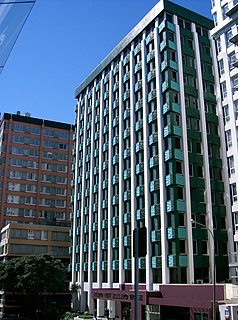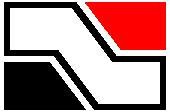A state-owned enterprise (SOE) or government-owned enterprise (GOE) is a business enterprise where the government or state has significant control through full, majority, or significant minority ownership. Defining characteristics of SOEs are their distinct legal form and operation in commercial affairs and activities. While they may also have public policy objectives, SOEs should be differentiated from government agencies or state entities established to pursue purely nonfinancial objectives.

Public sector organisations in New Zealand comprise the state sector organisations plus those of local government.

NZ Post, shortened from New Zealand Post, is a state-owned enterprise responsible for providing postal service in New Zealand.
A Crown entity is an organisation that forms part of New Zealand's state sector established under the Crown Entities Act 2004, a unique umbrella governance and accountability statute. The Crown Entities Act is based on the corporate model where the governance of the organisation is split from the management of the organisation.
Council-controlled organisations (CCOs) and council-controlled trading organisations in New Zealand are what were formerly known as local-authority trading enterprises (LATEs). Introduced under Sections 6 and 7 of the Local Government Act 2002, they are essentially any company with a majority council shareholding, or a trust or similar organisation with a majority of council-controlled votes or council-appointed trustees, unless designated otherwise. More than one council may be represented in a council-controlled organisation.
Television in New Zealand was introduced in 1960 as a state-run service. The broadcasting sector was deregulated in 1989, when the Government allowed competition to the state-owned Television New Zealand (TVNZ). There are currently three forms of broadcast television: a terrestrial (DVB-T) service provided by Freeview; satellite services provided nationwide by both Freeview and Sky; and an internet television service delivered over cable and fibre broadband provided by Vodafone.

The New Zealand Forest Service was originally established in 1919 as the State Forest Service. The State Forest Service changed its name to the New Zealand Forest Service in 1949, at about the same time that the Forests Act of 1949 passed through Parliament.

Radio New Zealand, commonly known as Radio NZ or simply RNZ, is a New Zealand public-service radio broadcaster and Crown entity that was established under the Radio New Zealand Act 1995. It operates a news and current-affairs network, RNZ National, and a classical-music and jazz network, RNZ Concert, with full government funding from NZ on Air. Since 2014, the organisation's focus has been to transform RNZ from a radio broadcaster to a multimedia outlet, increasing its production of digital content in audio, video, and written forms.
Tranz Rail, formally Tranz Rail Holdings Limited, was the main rail operator in New Zealand from 1991 until it was purchased by Toll Holdings in 2003.
The New Zealand Post Office (NZPO) was a government department of New Zealand until 1987. It was previously named the New Zealand Post and Telegraph Department.
The Ministry of Transport is the public service department of New Zealand charged with advising the government on transport policy.

The New Zealand Treasury is the central public service department of New Zealand charged with advising the Government on economic policy, assisting with improving the performance of New Zealand's economy, and managing financial resources.
A crown agency was an administrative body of the British Empire, distinct from the Civil Service Commission of Great Britain or the government administration of the national entity in which it operated. These enterprises were overseen from 1833 to 1974 by the Office of the Crown Agents in London, thereafter named the Crown Agents for Oversea Governments and Administration. Crown Agents for Oversea Governments and Administrations Ltd became a private limited company providing development services in 1996.
A statutory corporation is a corporation created by the state. Their precise nature varies by jurisdiction, thus, they might be ordinary companies/corporations owned by a government with or without other shareholders, or they might be a body without shareholders that is controlled by national or sub-national government to the extent provided for in the creating legislation.

New Zealand Railways Corporation (NZRC) is the state-owned enterprise that owns the land beneath KiwiRail's railway network on behalf of the Crown. The Corporation has existed under a number of guises since 1982, when the old New Zealand Railways Department was corporatised followed by deregulation of the land transport sector. In 1986, the Corporation became a State-owned enterprise, required to make a profit. Huge job losses and cutbacks ensued, and the rail network, rail operations and ferry service of the Corporation were transferred to New Zealand Rail Limited in 1990. The Corporation retained ownership of the land beneath the railway network, and charged a nominal rental to New Zealand Rail, which was privatised in 1993, and renamed Tranz Rail in 1995. In 2004, following a deal with Tranz Rail's new owners Toll NZ, the Corporation took over responsibility for maintaining and upgrading the rail network once more, trading under the name ONTRACK. Negotiations with Toll over track access charges concluded after four years with no agreement reached, so the government purchased the entire rail and ferry operations, naming the service KiwiRail. ONTRACK's railway infrastructure and employees were then transferred to KiwiRail in 2008, which itself was initially a subsidiary of the Corporation. On 31 December 2012, the Corporation once again became the landowner.
Crown corporations in Canada are government organizations with a mixture of commercial and public-policy objectives. They are directly and wholly owned by the Crown.

New Zealand Maori Council v Attorney-General, also known as the "Lands" case or "SOE" case, was a seminal New Zealand legal decision marking the beginning of the common law development of the principles of the Treaty of Waitangi.
The Shipping Corporation of New Zealand was a New Zealand shipping company created by the Third Labour Government led by Norman Kirk in 1973.
Thompson & Clark Investigations Ltd, known as Thompson and Clark or TCIL is a New Zealand private investigation agency founded in 2003 by principals Nicolas Guy 'Nick' Thompson and Gavin Shane Clark. The company has been involved in repeated scandals over spying on environmentalist and activist groups, often on behalf of government agencies and state-owned enterprises. In December 2018 after a scandal involving spying for government agencies the company was removed as a preferred supplier by the New Zealand Government.





